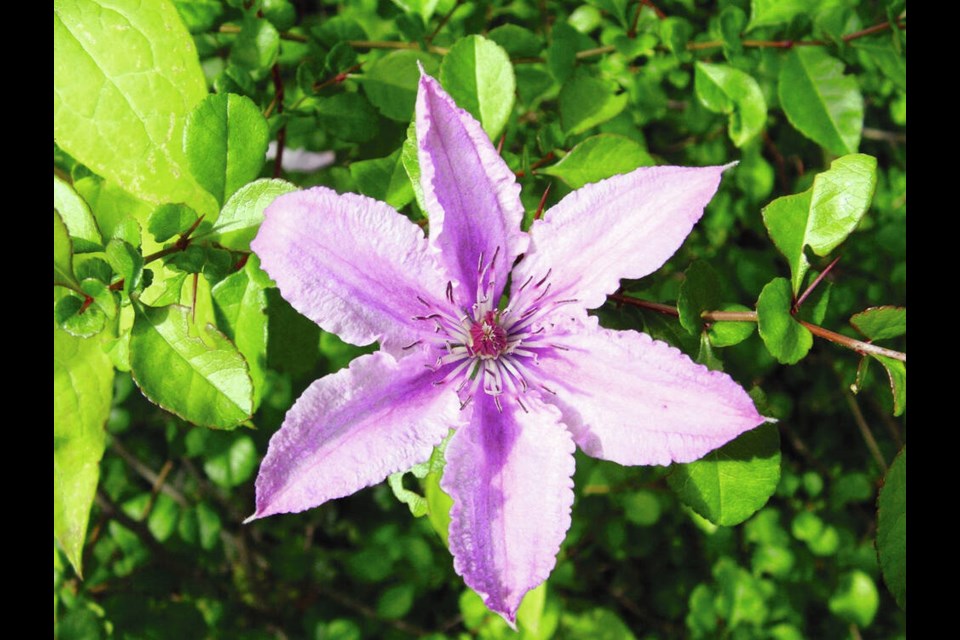Dear Helen: My Barbara Dibley clematis vine grows well, but the faded colouring of the early summer flowers is disappointing and the flowering period is short. Should I be pruning the vine? Could that be the problem?
M.C.
Barbara Dibley is prized for its large, soft mauve flowers with dark lengthwise strips down the centre of each petal. Unfortunately, the beautiful blooms fade in full sun. Part shade or significantly filtered sunlight brings out the most vivid colouring in the flowers.
This clematis blooms most heavily in late spring to early summer, on growth produced in the previous year, and again in September on the current year’s stems. Because of this twice-flowering habit, pruning can be as simple or as complex as you choose.
The simple option: Leave the vine alone. When it becomes crowded, tangled and bare-bottomed, cut it down close to the ground. New growth will appear quickly, and prolifically. Keep this fresh growth thinned to the strongest stems, and train them to the vine’s support.
A more hands-on approach: After the spring to early summer flowering period, cut back stems that have flowered. In late February or early March, remove dead and weak growth, and thin the stems enough to relieve congestion.
Dear Helen: We have three zucchini plants, spaced about 15 metres apart. They have been very healthy, with an abundance of female flowers but absolutely no male flowers. In 50 years of gardening I have never experienced this. Is there some explanation?
C.E.
I agree that this is most unusual. The issue that most commonly occurs is plenty of male flowers and few or no females — usually early in the season, when the males typically show up first to ensure there is plenty of pollen around when the females make an appearance.
The explanation could lie in any of a number of factors, or a combination of several factors. Among them are high heat levels along with other stresses such as drought or some adverse soil condition. High nitrogen levels in the soil are a possible cause.
I’m wondering why you space the zucchini plants so far apart. As long as both male and female flowers appear on the plants, growing them in close proximity helps to ensure the presence of adequate pollen where it is needed.
The general weather quirkiness this year may also be a factor. My zucchini plants have grown and produced in a rather erratic manner this summer.
Dear Helen: I’m noticing that the western red cedar trees in my area seem to be overloaded with cone clusters this year. Has this come to your attention at all? If they are, I’m wondering what the abundant seed production could mean.
T.O.
The cedar tree beside my back lawn, and the other red cedars in the neighbourhood, all have branches drooping heavily downward with the weight of cone clusters. I’m not really sure whether the seed production this year is greater than usual, but it certainly is noticeably abundant.
It is well known that plants under stress produce more seeds, to ensure the survival of the species in threatening conditions. It is also well known that western red cedars have been under considerable stress in recent years. Dead and dying cedars are a common sight along highways in some parts of the island. Cedars with dead tops are also evident. Drought is the issue.
Because the cell walls of western red cedar wood are thin, the trees are particularly susceptible to summer drought. Collapsed cells can no long serve as conduits of moisture. The result: a tree’s top dies back.
GARDEN EVENTS
View Royal show and sale. The View Royal Garden Club will welcome the public to a fall garden show and plant sale on Saturday, Sept. 17, 1 to 3 p.m. in Wheeley Hall, behind Esquimalt United Church, 500 Admirals Rd. Entrance off Lyall St. Judged exhibits will include perennials, vegetables and fruits, potted plants, herbs and more. Admission $5.00, includes refreshments and door prize tickets.
Plant sale. The Peninsula Garden Club will hold a fall plant sale on Saturday, Sept. 17, from 9 to 11 a.m. in the Mary Winspear Centre in Sidney. Great prices on a wide selection of fall perennials.


